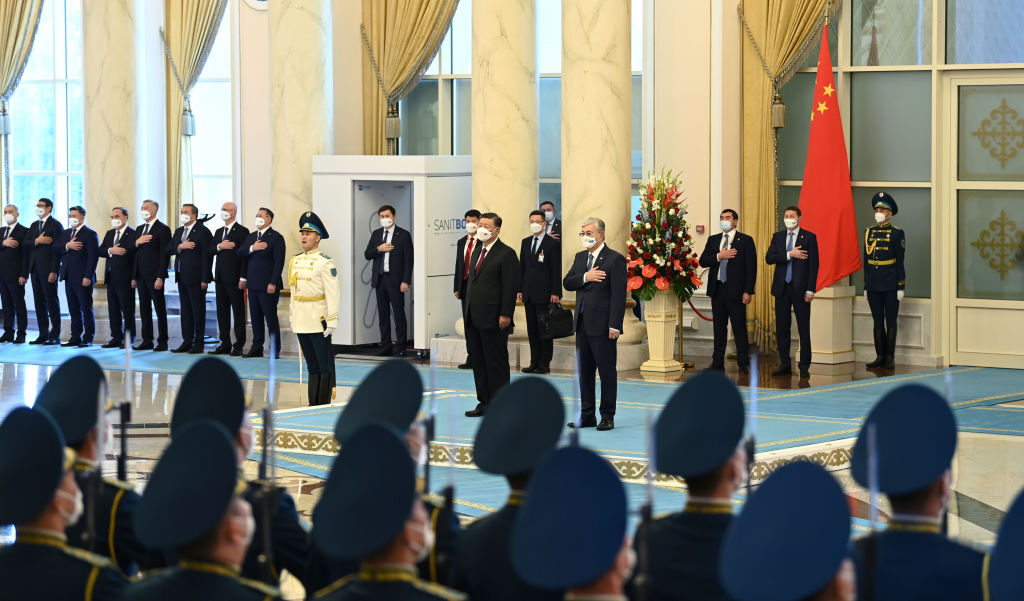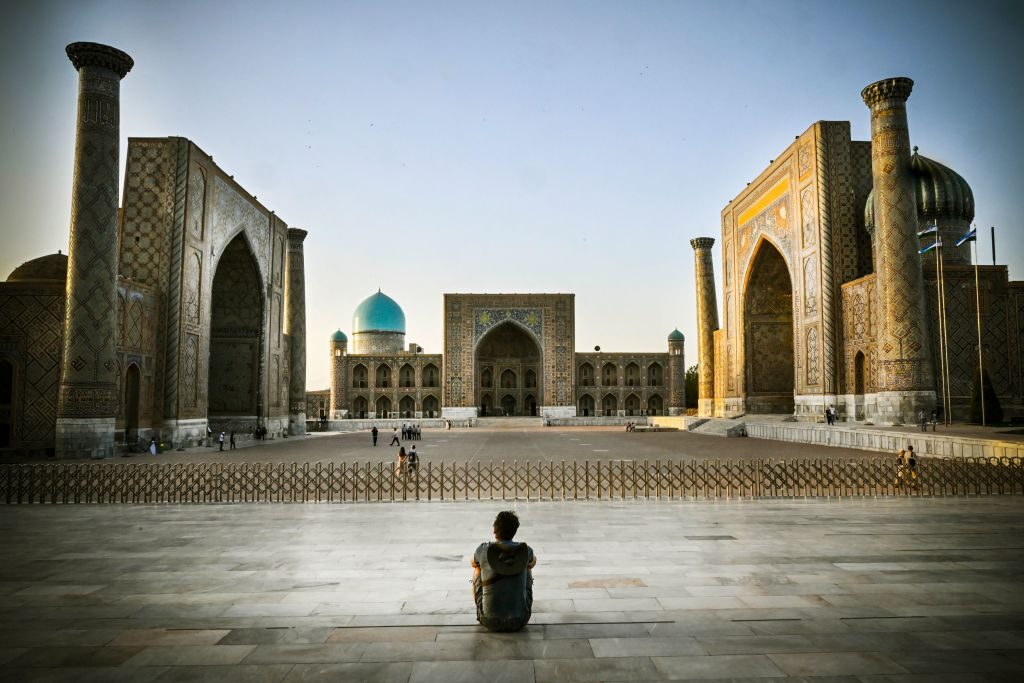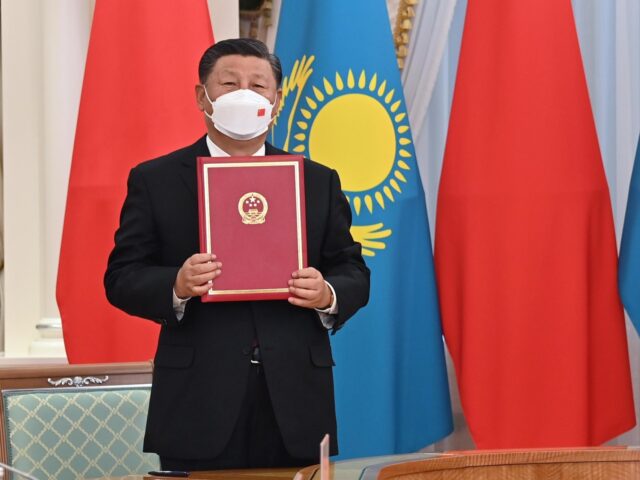Chinese dictator Xi Jinping landed in Kazakhstan on Wednesday – his first travel abroad since his nation caused the Chinese coronavirus pandemic – for a short tour to increase the nation’s economic reliance on China and promote “security and defense cooperation.”
In addition to meeting with Kazakh President Kassym-Jomart Tokayev, Xi will travel to Samarkand, Uzbekistan, to attend a meeting of heads of state of the Shanghai Cooperation Organization (SCO), a central Asian trade group. Xi is expected to meet with one of his closest allies, Russian leader Vladimir Putin, at that event.
Xi’s investment in closer ties with Kazakhstan is of particular note given the ongoing genocide of Turkic people in occupied East Turkistan, which Xi launched as an alleged “counter-terrorism” campaign in 2014.
By 2017, Chinese Communist Party officials were imprisoning millions of people in East Turkistan, which borders Kazakhstan, in concentration camps, where survivors say they were subject to slavery, extreme torture, indoctrination, gang rape, and bizarre medical experiments.

Kazakhstan’s President Kassym-Jomart Tokayev welcomes President of China Xi Jinping with an official ceremony at Akorda Presidential Palace in Nur Sultan, Kazakhstan on September 14, 2022. (Presidency of Kazakhstan / Handout/Anadolu Agency via Getty Images)
Much of the free world, including the government of the United States under both presidents Joe Biden and Donald Trump, consider the extermination of Turkic people in East Turkistan to fit the definition of genocide.
East Turkistan is home to an estimated 1.6 million ethnic Kazakhs, yet the government of Kazakhstan has remained friendly with China and largely abstained to comment on the genocide.
Kazakh authorities have also silenced protests within its borders by Kazakh people in defense of their relatives repressed by China.
Xi arrived in the national capital Nur-Sultan, formerly Astana, on Wednesday to regal fanfare. He later met with President Tokayev to receive the nation’s top honor for foreign nationals, the “Order of ‘Altyn Kyran,'” for allegedly making a “special contribution” to friendly ties between the two states.
习近平14日下午抵达了努尔苏丹,开始对哈萨克斯坦共和国进行国事访问。习近平将出席在撒马尔罕举行的上海合作组织成员国元首理事会第二十二次会议,并对哈萨克斯坦和乌兹别克斯坦两国进行国事访问。习近平下飞机时没踩好阶梯,出现脚滑。 pic.twitter.com/WAhOs2Uiiw
— 自由亚洲电台 (@RFA_Chinese) September 14, 2022
🇿🇳 President Kassym-Jomart Tokayev awarded President Xi Jinping of China with the highest state award Kazakhstan – Order of "Altyn Kyran" for his special contribution to the strengthening and development of bilateral political, economic and cultural ties between two countries. pic.twitter.com/WZTW70JemB
— President Kassym-Jomart Tokayev's Press Office (@AkordaPress) September 14, 2022
President Xi received the Order of the Golden Eagle awarded by Kazakh President Tokayev in recognition of his extraordinary contribution in consolidating friendship between the two peoples and in promoting Kazakhstan-China relations. pic.twitter.com/C2V5CTUMST
— Hua Chunying 华春莹 (@SpokespersonCHN) September 14, 2022
Xi departed for Uzbekistan late Wednesday. Tokayev reportedly did not address the genocide of Kazakhs and other Turkic people that Xi is currently presiding over during the visit.
Xi, however, appeared to address the crackdown in an article written for Kazakh media and published on Tuesday, in anticipation of his arrival. The Chinese communist dictator made special mention of “security” cooperation with Kazakhstan to combat “terrorism,” the terminology Beijing has traditionally used to refer to and justify the genocide.
“China would like to deepen law enforcement, security and defense cooperation with Kazakhstan,” Xi wrote, according to a translation by China’s state-run Xinhua news agency. “We should join hands to combat terrorism, separatism, extremism, drug trafficking and transnational organized crimes, and ensure the security of oil and gas pipelines and other large cooperation projects and their personnel.”
Xi also thanked Kazakhstan in the article for previous “unwavering support on the core issues bearing on our respective sovereignty, security, and territorial integrity.” The Chinese government usually uses those terms to refer to its false claim of sovereignty over the nation of Taiwan and its opposition to pro-democracy movements in Hong Kong, Tibet, and East Turkistan.
Kazakh authorities have done little to challenge Xi’s genocide of Kazakh people, despite a longstanding campaign to repatriate ethnic Kazakhs that resulted in many Kazakh citizens now having family in East Turkistan. Travel from the region to Kazakhstan was once common but has dwindled as China began counting foreign travel as evidence of “terrorism” when non-Han people living in East Turkistan participated in it. Chinese police expanded that police later to include non-Han people living in East Turkistan who publicly expressed any interest in traveling abroad, including to allied countries such as Kazakhstan.

A man sits at the Registan square in downtown Samarkand on September 13, 2022. A regional summit this week where Russian President Vladimir Putin will meet China’s Xi Jinping and other Asian leaders will showcase an “alternative” to the Western world, the Kremlin said on September 13, 2022. Putin and Xi will be joined by the leaders of India, Pakistan, Turkey, Iran and several other countries for the summit of the Shanghai Cooperation Organisation (SCO). (ALEXANDER NEMENOV/AFP via Getty Images)
In addition to public silence on the genocide, Kazakh officials have barred human rights activists involved in investigating the genocide from the country. At home, protesters seeking to peacefully manifest in front of the Chinese embassy in Almaty have found themselves at odds with police.
The government, Radio Free Europe/Radio Liberty (RFERL) reported last year, has “shut down organizations, arrested activists, and intimidated high-profile figures into exile, leaving only a small but devoted segment for public protests” in response to concern regarding Kazakhs in East Turkistan.
In exchange for political loyalty, China has rewarded Kazakhstan with heavy investment as part of its Belt and Road Initiative (BRI), a global infrastructure plan in which China offers predatory loans to poor nations to be used to pay China to build roads, ports, and railways. Xi debuted the concept of the BRI in Kazakhstan in 2013 as a “new Silk Road” modeled after the ancient trade route connecting China to western Europe and has often touted the importance of Central Asia in the success of the project.
“Next year will be the tenth anniversary of the Silk Road Economic Belt initiative that I first proposed during my visit to Kazakhstan in 2013,” Xi wrote in his article this week. “Setting our sight beyond the pandemic, China would like to partner with Kazakhstan to remain pioneers in Belt and Road cooperation.”
“We should improve investment and trade facilitation, fully unleash the potential of border ports and cross-border transportation, and cultivate new sources of growth such as artificial intelligence, big data, digital finance, e-commerce and green energy,” he urged.

COMMENTS
Please let us know if you're having issues with commenting.